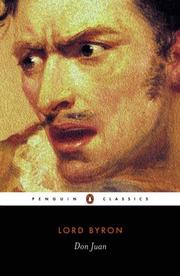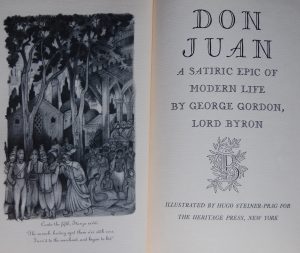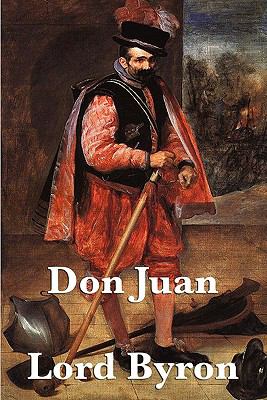Don Juan – Lord Byron – 1818

Reviewed by: Michael Sympson Date: 19 September 2001
When it comes to Byron, people can be opinionated. Listen to this:
“I think I owe my mother-in-law a big apology. You know the poetry. The kind the older generation uses for birthdays and farewell luncheons (“We hope that God will bless// You with good health and happiness!”). You hate it, the forced rhymes and imperfect metrical structure (indeed, what metrical structure?). My mother-in-law used to write like that – volumes and volumes of such tripe. Sadly, she has departed from us, but not before leaving tons of this stuff all over the house, and a half-finished vanity press run of 100 copies (anybody want one?).
“Now I know where she got the impetus for such poetry – Lord Byron! All of that generation’s worst excesses of bad poetry come from Byron, I think. Embarrassingly forced rhymes, self-conscious commentary that frustratingly impedes the flow of the narrative, arch cuteness that threatens one’s sanity – all there!! And he couldn’t even finish it off properly.
“Truly, a work only an academic could love – or find any value in. If you are attracted to this book, protect yourself: Try reading it aloud and making a stop at the end of every line (sing-song-like) so you can at least get the sense of the rhymes. I found the Penguin edition serviceable (as Penguins usually are). And don’t bother with the footnotes, just let it flow. Now stop being so hard on the older generation.” (E. G. Barnes)
Without actually debating it, the “academic,” – in this case W.H. Auden – has a piece of his own advise here, and it is not so far removed from Mr. Barnes’ observation. It may actually do the trick:
“Unlike most poets, Byron must be read very rapidly as if the words were single frames in a movie; stop on a word or a line and the poetry vanishes – the feeling seems superficial, the rhyme forced, the grammar all over the place – but read at the proper pace, it gives a conviction of watching the real thing which many profounder writers fail to inspire, ….”
He continues:
“Serious poetry requires that the poet treat words as if they were persons, but comic poetry demands that he treat them as things and few, if any, English poets have rivaled Byron’s ability to put words through the hoops.”
So far so good. But what do we actually get out of all this? Let’s hear the guru:
“Don Juan is sometimes boring but pre-eminently an example for a poem which is not a bore. To enjoy it fully, the reader must be in a mood of distaste for everything which is to any degree a bore, that is, for all forms of passionate attachment, whether to persons, things, actions or beliefs. This is not a mood in which one can enjoy satire, for satire, however entertaining, has its origin in passion, in anger at what is the case, desire to change what is the case into what ought to be the case, and belief that the change is humanly possible. … , as a whole, “Don juan” is not a satire but a comedy.”
Okaaaaaaaay???!?…?……….?

“… Byron’s choice of the word “giggle” rather than laugh to describe his comic intention deserves consideration. … Most readers will probably agree that the least interesting figure in “Don Juan” is its official hero … he seems to be a daydream of what Byron would have liked to be himself.”
Let’s stop right here! Forgive my naivety, Mr. Auden, but a comedy is supposed to make me laugh, or “giggle,” and I must say there is very little in Byron’s obese production that has this effect on me, in fact even Shakespeare is in this respect not exactly a giant of comical entertainment. Like yesterday’s news, nothing ages so soon as a joke. Byron’s “Don Juan” is a rather stale affair and in this respect almost matches the musty smell of “Much Ado about Nothing.”
Of course we read Shakespeare for the abundance of qualities he had beside of his meager comical talent; but what else is there Byron has to offer, except for his hereditary peerage? He was a rock star, a Garry Glitter of his period, and not much else. Pushkin, who admired Byron, read him in French prose translations, which makes you wonder, what exactly had been translated? Imaginative literature of every genre usually comes in two categories, either as a piece that tries to convey something, or as a stand-up routine. Both categories are legitimate, but personally I prefer the former. So it must be me, when I look around and find Byron performing his routine in a place filled with deadly silence. Perhaps all the other people are from the Norwegian soccer team and use to laugh inside. However there is at last one good thing that came out of all this, and this is Auden’s explanation of Byron’s stanza:
“The very qualities of English ottava-rima which force a serious poet to resort to banal rhymes and padding are a stimulus to the comic imagination, leading to the discovery of comic rhymes and providing opportunities for the interpolated comment and conversational aside … . As a unit, eight lines give space enough to describe a single event or elaborate on a single idea without having to run on to the next stanza. If on the other hand, what the poet has to say requires several short sentences, the arrangement of the rhymes allows him to pause at any point he likes without the stanza breaking up into fragments for his separate statements will always be linked by a rhyme. The stanza divides by rhyme into a group of six lines followed by a coda of two, … or seven lines for the theme and … the final one as a punch line.”
Want to give it a try?















